|

songs | interviews | photos | tours | boots | press releases | timeline
Samsonic (the Netherlands)
Dutch music magazine
September/October 2001
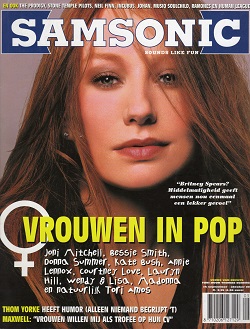
Tori Amos
by Serge Simonart
photos by Thomas Schenck
Tori Amos stays in the extraordinary luxury suite of the post-modern design jewel The Sanderson in London, and gives her interviews there. For her new album Strange Little Girls she recorded twelve covers of songs from male composers.
Last night it was full moon. Sade and Jennifer Lopez almost change into werewolves such nights. How about you?
Tori Amos: People have been aggressive to me all night and evening. I was completely out of balance yesterday; that's been a long time. Just felt like a black widow in a city of sharks and werewolves. So it was full moon? That's comforting, I can tell myself that's the reason. I'm not a soft nymph of the woods as people say; I'm not addicted to astrology or something like that. But I do believe that the planets have some magnetic effect on us. Every time it's full moon, I just know. I feel it during the daytime, even when I don't see the moon. And who knows how Mars has been fooling around last night.
There are masses of websites dedicated to you, where fans and amateur-psychologists analyse your lyrics and your personality to death. Which reactions on your music surprise you most?
Tori Amos: I get letters from a female psychiatrist frequently, she works at a shelter for raped women and victims from violence within the family. She played my song 'Me and a Gun' for twenty sentenced serial rapists, and asked them to listen to the lyrics carefully. The song is about rape, and I sing the lyrics from the point of view of the humiliated, abused woman. That psychiatrist wrote me, that it left almost all of them cold. Most didn't move a little. Some said that the singer must have been frigid. Others were saying that she just acted like she didn't enjoy it to increase the excitement. You know, the old cliche; she says no, but she means yes. Disgusting! Somehow I hoped that some of those men would get the message.
Why doesn't that happen, you think?
Tori Amos: The only thing I can think of, is that a rapist who opens up for the suffering of his victim, indirectly admits that he's a monster. And they don't think of themselves as monsters, but as real men who are treated unjust. The letters that that women write really do a lot to me. But I also get nice letters. Like last week, from a couple of whores on a ranch at Nevada. In that American state is not only gambling, but also prostitution legal, so that desert is full of brothels. So, a couple of hookers over there play 'Leather' when they're in the jacuzzi or in bed, while the customer jumps at them. Or after a hard night, to cool down. I like that idea. I've got a few friends who flirted a little with prostitution. No real whores - housewives who do it once in a while to make a little extra money. One of them is a very bad businesswoman - if her customer messes it up, or tells about his problems at home, she just can't make him pay. But she spreads soon. Hey Charlie, you need to go there! Complain about your wife or about your dad who has cancer and it's for free! The hooker with a heart of gold. (laughs)
What do you think of men who visit prostitutes?
Tori Amos: Well, if you go to a whore, you actually say, "I admit that I am not able to meet a woman in an ordinary way. I am too lazy to invest time, energy and love in a woman, and I don't have any pride or self-respect either." But a lot of men pay a whore also for comfort and tenderness. A hole to fill and a shoulder to cry on. Very typical is the case of the murderer of John Lennon. That man, Mark Chapman, ordered a call-girl the night before he shot Lennon. Later, she told the police he had asked her to be completely silent during the deed, "like you sleep." And "sleep" of course stands for "dead." That's why I choose the call-girl disguise for the picture of 'Happiness is a Warm Gun.'
You start about the pictures now and I have to admit: your cover is very inventive again. Your new album shows us thirteen different women. Thirteen variations - eleven women and one twin - covering the theme Strange Little Girls. How did it feel like to see yourself in all those different disguises?
Tori Amos: I don't have the feeling I'm looking at myself. Those are the main characters from the twelve songs I covered. But I know all those kinds of women. It doesn't take a lot to let this one (points at squinting femme fatale) come up in myself, or this one (the French looking woman). She was in the resistance in 1942. She wanted ten orgasms a day, because chances were high she would be arrested and executed by the Nazis, and it could be her last ten orgasms. She's as intense as they come. She comes ejaculating up in me, when I feel threatened. And this one (the call-girl) is so sweet. If her customers want to shit on her, she speaks softly, "No, we're not gonna do that, that is not your thing." She is the prototype of the abused woman who approaches assholes in an understanding way. Now the twins are good for me when I need protection, against swindlers or the wrong type of business-relations. They know how to play the game with the big boys. Very hard to get those two out of balance. By the way, the cd also gets four different cover pictures. They do it with magazines, too - Elle sometimes makes two covers from the same issue and they see which one sells best. I'm curious which Tori my fans want - the cool one, the hot one, the slut, the virgin, the glamour puss, the twins or the librarian.
It feels like Cluedo! Which of the thirteen is seen by men as an easy prey, you think?
Tori Amos: The librarian. She doesn't live for real, she's only doing research. Such a New Age type with a boring haircut and big glasses. Glasses are - for men - always a sign of vulnerability.
Models sometimes dress in a boring way on intention when they want to shop, so that they will be unnoticed. They ugly up...
Tori Amos: Oh, but I have a friend who is a model, and she gets more attention when she wears glasses. Men saw an attractive woman with glasses, and thought, "Now that one is easier than one without glasses..."
And which of those women would you ask for advice yourself when you were in trouble?
Tori Amos: This one, who symbolises Death in Time. The Death is real; she doesn't need a mask or a pose, etiquette, tact or hypocrisy. All those things that make up the communication between mortal people. Death and the passing of Time are almighty, so they can talk freely.
You sing 'I'm Not In Love' from 10 CC very slowly, you almost spell the vowels. And it was for the first time that I heard how arrogant those lyrics are!"
Tori Amos: Yes, it's ironic that this has been the ultimate slow dance for teenagers in love for years. The singer is really super-cynical, and the lyrics show a superiority complex that doesn't know its equal in pop music. He just has a hard on and looks down on the girl he sings about. I think that the men from 10CC where deeply on coke at the time, because this is real cocaine arrogance. Plus the arrogance from a pop-star that has hundreds of girls down at his feet and can say, "Alright, you can give me a blowjob, but don't you dare think I care about you." In my song it's different, "You're not in love? Well, I'm not in love either, sucker!"
Which other songs from male singers and composers did you want to record, but didn't make the album?
Tori Amos: 'Marlene Dietrich's Favourite Poem' from Peter Murphy. But my version was too little different from his one. I'd love to have done 'Sick of You at the Harpsichord' from Iggy Pop as well. He's typically a superman, who deserves to get his macho lyrics finally back in his face, just like a boomerang. And I love the word 'harpsichord.' I think it's amazing when really fine, old-fashioned instruments like that appear in such a raw rock song. But I couldn't find a good one in time, and we were in a hurry. The moment was just gone as well; my projects have an expiration date. I'm on fire quickly, but I'm like fireworks; some intense noise and flashy lights, and then it's gone.
Why not a Prince song? He's the man who sings ultra-sexual, sharp man-woman songs, which he sings clearly from a male point of view.
Tori Amos: The American comedian Sandra Bernhard once made an incredibly sarcastic cover version of 'Little Red Corvette,' where I sing the backing vocals. That's years ago, just after my hard rock LP Y Kant Tori Read flopped. So that part was covered. But now that you bring it up, I'm starting to feel a little sorry. (laughs) Prince is such an archetype, isn't it? He is so small, and still every part of him looks so big: his hormones, his talent, his mouth, teeth, eyes, hands and probably his dick as well. He has a double portion of everything. And his songs are perfect to hang around in the head of such a super-macho. I really wanted my versions of those male songs to become "the word made flesh," like in the Bible. By interpreting their lyrics from a feminine point of view, I took possession of their seed. You take a man's word, you take his seed. I went in their heads, and if I turn their words against them, it's checkmate.
Did you actually tell those men about your plans? Lou Reed, Eminem, Bob Geldof, Joe Jackson, Neil Young...?
Tori Amos: No. I approached their companies, so they know about it. But I didn't approach them personally. That would have looked too much like I asked permission, and I don't want to give this project less power through their opinions. Imagine Lou Reed would say, "What a crazy idea! Who does she think she is?" Maybe it's a matter of self-protection as well. Most men don't like it if you show them a mirror. This is the way I see it - I started a relationship with the daughters of those male composers. And what matters are your feelings towards the one with whom you have a relationship. What mom and dad think about, it doesn't matter.
In America people are talking about the 'Alpha Male'; the prototype of the superman which all men like to compare themselves to. Who is the Alpha Male in pop music and why didn't you recapture any of his songs for the women?
Tori Amos: K.D. Lang. Is that a correct answer? (laughs) Where is the Alpha Female by the way? That's Madonna of course. It's predictable, and I'm not really a fan, but she's a hunter, a mother, a career woman, a leader, an anarchist, a marketing project and mouthpiece at the same time. If only because she exists as a counter balance against all those Alpha Males, we should pay honour to her as female artists.
A cliche question that all female singers face is: 'How does it feel to be a woman in rock?' Why do you think that male musicians are never asked how it feels to be a man in rock?
Tori Amos: I notice that in America at this time there is backlash in alternative music. When I started, and later with Alanis Morissette and Courtney Love, etc, it suddenly became hip to promote women. But now the tide is on the turn again. Radio stations don't program a lot of women in a row anymore. We're back to one female artist an hour. As a mere formality. I believe that our generation for the first time gets hit by men, because all of a sudden career women are walking in their way. The whole feminist movement shuffled the role of men in society, and everyone is somewhat nervous now, because there doesn't exist a blueprint for the new situation. Men do not know how to behave, and some think, "Things may get even worse." (laughs) So they start to defend themselves. What I learned from Madonna, but also from other women who preceded me as an artist in other disciplines, revolutionary paintresses like Georgia O'Keefe and Freda Kahlo, the suffragettes who fought for women in the beginning of the last century... But we don't live in a culture that stands still at the victories of former days.
Is it not just the backlash from a trend? That radio stations are thinking: Alanis, Tori, we know them by now. Time for something else.
Tori Amos: That could be part of it? But we, women, have had to fight for our rights for forty years. Until eighty years ago, women had no rights at all - no suffrage, always proved wrong with divorces, all the suppression... And now, when we finally through hard working gained our rights, there is suddenly an anti-freedom again. That is very disturbing.
Did you ever talk about this with male colleagues?
Tori Amos: Yes, but they're speaking out, isn't it? Some musicians say, "Tori is fucked up." They think I'm a foolish, frustrated and probably frigid ball-breaker, a neurotic woman whose aim is to castrate men. Others share my frustrations; I know some male musicians who hate to see how senseless rap and hip-hop have become. I mean, how inspiring was Public Enemy?! And how trivial is the "bitch-yo-faggot" nonsense in most hip-hop albums today?
How do think about the attitude to life from singers as Kelis?
Tori Amos: Who?
I mean, the woman who sings 'I hate you so much right now'.
Tori Amos: What does she mean? All men are evil? Sorry, never heard of. But I think it's okay if people say what they think and feel, as long as they mean what they say. What I find much more annoying, are artists who are pretending they're fulltime Satanist, at the stage encouraging ten-thousand fans to skin their pets and crucify their grandmothers, but who are constantly phoning their lawyer and their accountant when they're backstage. I can't stand negative posers, who are pretending rebellion and deviations because it scores with not-too-witty teenagers.
You mean Marilyn Manson now?
Tori Amos: Him and other marketing projects. I wasn't saying any names, because there are too many of those hypocrites and I didn't want to pick any.
What do you think of the Britney's and Christina Aguilera's of our world, and of the fact that their lyrics, songs, images, videos and shows are set up mainly by men?
Tori Amos: Oh well, whatever they want. The advantages and disadvantages of Britney are equally big. She peps up little girls, that's okay. She gives them an example and makes them more self-assured. That okay, too. But she also makes them think that what she does and what she thinks should be the Ultimate Dream from every girl. And that's not okay at all. I believe that the success these Barbie dolls have, lays in the fact that the audience likes to listen to music that is not too good. People want songs they can sing along under the shower or in the car, and artists who are average enough to make their fans think that they would be able to do the same. On the other hand, I am sure that Prince - also at the top of his fame - got so much criticism because his is superior so easily. What Prince does, is on all fronts so difficult that no one ever thinks, "Hey, I could do that too!" So that doesn't make the average listener feel good. Prince's talent is so enormous that it is threatening to some people. There used to be a balance between the side of Jimi Hendrix, Joni Mitchell, The Doors and Miles Davis and the side from the trivial pop music. But the "good" side became much smaller. A female acquaintance of mine asked me very seriously last week, "Tori, make someone give me a contract with a record company. That's so much easier than some job at an office." I am afraid that deep down every thinks he's an artist.
Final question: when was the last time you heard a song by a man that shocked you? That you wanted to call him to account after listening?
Tori Amos: I don't have an example of a song, but I have something else: an article by Martin Ames on porn industry in California. The message was that sex isn't sufficient anymore. I mean, we can't help that porn exists and the industry got certain rules. Like first take a look at the exit signs when entering a dark room. And when you really feel like having sex with peeing and so on, than do it in the corner and for god's sake not on the carpet, okay? But what's new, and very disturbing is the trend described by Amis that has been summarized in the yell, "Pussies are bullshit!" Directors from porno movies mean by this that the pussy is synonymous for "normal" sex, for pleasure. The trend that rules now is: only the anus counts, because it hurts more at that spot. Porno movies are no longer about pleasure, but only about causing pain. There needs to be put cactuses in anuses and we need to see how the woman bleeds, or otherwise it just doesn't count. Movies like that used to be an exception, but now they are the rule. And I need to say, if an industry, focused on enjoyment - morally correct or not - makes violence and humiliation its aim, then the end is near.
original article
 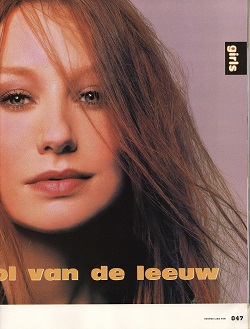
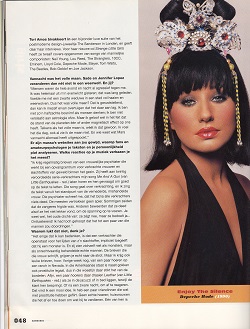 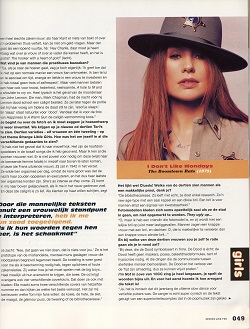
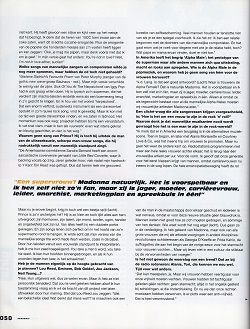 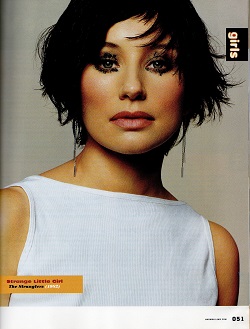
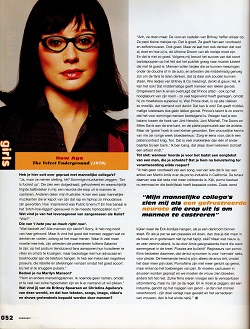 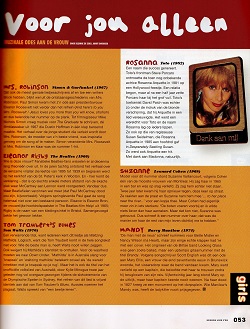
[scans by Sakre Heinze]
t o r i p h o r i a
tori amos digital archive
yessaid.com
|